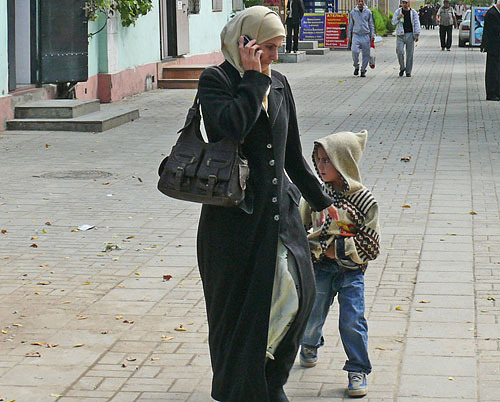
Ethnic Russians Increasingly Regard North Caucasus as Foreign Entity
Publication: Eurasia Daily Monitor Volume: 10 Issue: 194
By:

Russian pollsters say that the Russian public has changed its attitude toward the North Caucasus over the years. The authoritative Moscow-based polling organization, the Levada-Center, polled Russians about the North Caucasus throughout the 1990s and 2000s. “When the war was still ongoing in the North Caucasus, the dominant opinion [among Russians] was to suppress [the rebellion] by force,” the Levada-Center’s Natalia Zorkaya told Kavkazsky Uzel (Caucasian Knot). “Nowadays, the impression is that Russians would prefer not to see anything and not to know anything about what is going on in these regions” (kavkaz-uzel.ru, October 25).
The annual results of surveys since 2005 show that Russian attitudes toward the North Caucasus have changed in a number of ways. In November 2005, 8 percent of those polled said that the situation in the region was “calm” while 85 percent said that the situation was “tense” or “critical.” In September 2013, 20 percent of the respondents said that the situation in the region was “calm” while 69 percent said that the situation was “tense” or “critical.” By contrast, Russians’ assessment of the prospects for regional development has practically not changed over the past eight years. In November 2005, 12 percent of respondents said the situation in the North Caucasus would improve within the next year; 19 percent said that the situation would deteriorate; and 55 percent said it would remain the same. In September 2013, 9 percent of the respondents said they believed the situation in the North Caucasus would improve in a year, 18 percent said it would deteriorate and 59 percent said it would stay the same (https://www.levada.ru/25-10-2013/obstanovka-na-severnom-kavkaze-v-predstavleniyakh-rossiyan).
The pogroms in Moscow earlier this month (see EDM, October 17), which were triggered by the killing of an ethnic Russian, allegedly by an Azerbaijani citizen, reignited the Russian public’s wariness toward North Caucasians. The effect of the pogroms was further amplified by the suicide bombing in Volgograd on October 21, when Naida Asiyalova, an ethnic Avar from Dagestan, blew herself up in a bus in the predominantly ethnic Russian city, killing six people (see EDM, October 25). The Russian authorities are now so concerned about possible mass protests that even a small demonstration against terrorism, staged by some 50 residents of Volgograd following the bus bombing, was forcibly dispersed by the police (https://www.newsru.com/russia/25oct2013/teraktvolg.html). The Russian government appears to be under increasing popular pressure to react with extra resolve when North Caucasians attack ethnic Russians, whether as militants or petty criminals. The government’s reaction to crimes in which ethnic Russians are not victimized by North Caucasians is visibly milder.
Levada-Center director Lev Gudkov stated that the “rise of xenophobia in Russia started in the 1990s and climaxed in 2003. I do not mean hatred toward Caucasians only; anti-Americanism, hatred toward Central Asians, etc., rose in parallel. After 2003, the level of xenophobia dropped a little, but has remained very high ever since. I think xenophobia will stay at a fairly high level for the foreseeable future. I have been saying this for the past several years—that Russia is in a pre-pogrom state, and the question is only when and where it will explode” (kavkaz-uzel.ru, October 25).
Gudkov asserted that the aggression of Russians toward members of non-Russian ethnic groups was explained by life’s insecurities and a low trust in the government. North Caucasians, unlike Americans and Central Asians, are forced to share the same country with ethnic Russians, so the North Caucasians bear the full brunt of the rising xenophobia in Russia. According to Gudkov, Russians have become so tired of the North Caucasus that over 50 percent of those polled support the slogan “Stop Feeding the Caucasus!” The slogan implies that state subsidies to the region should be cut. The same percentage—over 50 percent—supports separating Chechnya from the Russian Federation. “The [North] Caucasus is progressively less perceived as part of Russia,” the pollster said (kavkaz-uzel.ru, October 25).
Indeed, another recent poll revealed that only 41 percent of Russians considered Dagestan to be part of the Russian Federation, while only 39 percent viewed Chechnya as part of Russia. In contrast to the attitude toward the Russian North Caucasus, nearly 60 percent of the respondents said they consider Crimea—the Black Sea peninsula, which is part of Ukraine—to be a Russian territory, while 44 percent said they would regard ethnic Ukrainians and Belarusians as ethnic Russians if they lived in Russia for many years. Only 7 percent said they would extend such a privilege to ethnic Chechens, Ingush and Dagestanis (https://vid-1.rian.ru/ig/valdai/Russian_Identity_2013_rus.pdf).
Paradoxically, the undeniable improvements in living standards in Russia in the past decade, due to better state fiscal discipline and a windfall of petrodollars, coincided with the rise of xenophobic attitudes in the country. The question remains: if ethnic Russians grew so hostile to ethnic non-Russians, especially North Caucasians, during a favorable economic period, what will their reaction be when the Russian economy experiences stagnation? In fact, according to official estimates, the Russian economy has stagnated in 2013 (https://ria.ru/economy/20130812/955674361.html). The recent wave of ethnic-Russian unrest, therefore, may signal that the relationship between the economy and inter-ethnic relations in the country is already manifesting itself through pogroms.




